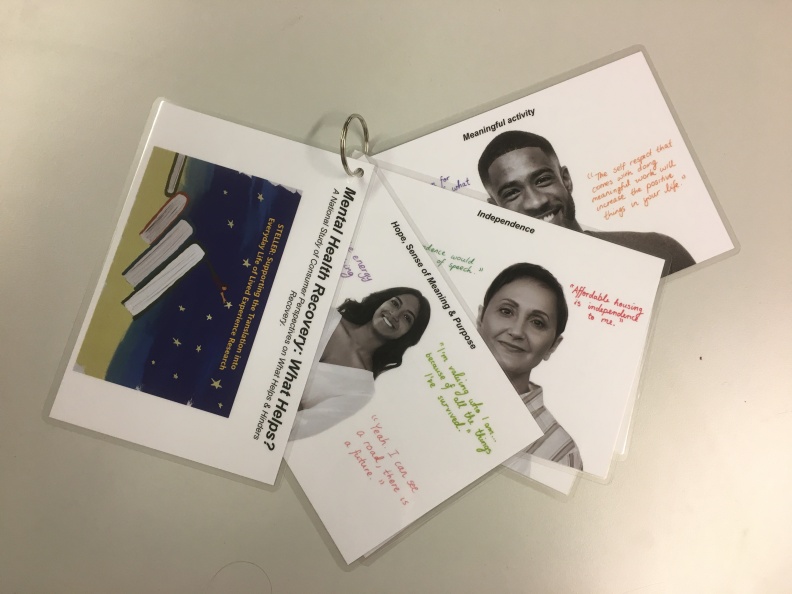Recovery means different things to different people. This research looked at the different ways people thought about recovery and what difference it made to them.

Onken, S., Dumont, J., Ridgway, P. A., Dornan, D., & Ralph, R. (2002). Mental Health Recovery: What Helps and What Hinders? NASMHP Publications, Alexandria, VA. Available at: https://www.nasmhpd.org/content/mental-health-recovery-what-helps-and-what-hinders-national-research-project-development
The Mental Health Recovery: What helps, What hinders report had 3 aims. The one of interest here is: To increase knowledge about what facilitates or hinders recovery from psychiatric disabilities. The research highlights the unique and individual nature of recovery. The following presents what people said helped their recovery. Direct quotes are in italics.
Basic Material Resources: What Helps?
Many people dreamt of equal opportunity and economic self-sufficiency. People wanted; a liveable income through employment, entitlements, or volunteer subsidies; a range of housing options; safe, decent affordable housing, with and without supports; transitional homes for people being discharged from hospitals, jail, prison, and others with unique needs, such as those who are dually diagnosed with addictive disorders, and specialized shelters were also mentioned.
“Because I have had a place where I could live and just be and feel safe, it really accelerated my recovery”
Some people also described social, material and spiritual resources that were made available to them through networks of friends, peers, families and self-help groups and churches were helpful. Peer advocates and expansion of peer-run services were recommended as effective measures to improve access to available resources.
“Need to take a more holistic view so that choices are available so not only treating our illness but our housing, our transportation, our training, our employment”
Self/Whole Person: What Helps?
People asserted they need to view themselves as whole, as more than mental illness, as a full complete human being. Qualities and attitudes that helped included: confidence, dignity, sense of humour, self-acceptance, self-esteem, hope, and trusting one’s self (including learning to trust one’s intuition). People also spoke of reclaiming their strengths and passions, being comfortable with themselves, being forgiving and having a positive outlook.
Taking personal responsibility, making their own decisions for their recovery, increasing self-determination and self-reliance were emphasized. Self-reliance and personal resourcefulness, especially when attempting to gain resources with which to live were important, as were motivation, perseverance, resourcefulness and self-sufficiency help.
“I would say just determination, not being kept down. I get back up and fight against what was happening to me, so I fought against my illness. I let it take hold of me for a long time and, in the end, I just still had enough spirit in me to want to continue a normal life and I had to fight to do so. It can be quite a fight because people will tell you that you can’t”.
“Well most of the journey of recovery, I feel I’ve done on my own and with the help of my sister. …….I believe you’ve got to help yourself. I’ve experienced if I don’t help myself, no one else is going to help me and I’ve experienced in life too that other people don’t want to help you”.
People managed their lives and mental health disorders in numerous ways. Self-management lessened the impact of the disorder. Order, stability, structuring their day with a routine helped as did health conscious activities such as having enough sleep, bike riding, yoga, reading a book. To take care of one-self requires experiential knowledge of strengths, knowing painful/difficult times will pass, survived once so can do it again, identifying triggers, seeking support from peers or others and advocating for themselves increased self-confidence.
“Well I try to monitor my illness, the symptoms and further on down the track I can look back at that and think ‘okay, what’s happening?’ I have a list of daily hassles, just normal everyday things that might make me upset. I look back and I think ‘okay, this is how I was a month ago, this is how I am now, am I improving, am I slipping back? I’ll say, like I’ve been through this experience and I’ve got the knowledge “
“having people support you, reminding you that you can get through this too, it just helps so much having people believe in you, because you can have the foresight to believe in yourself, but you feel so shitty”
“I find advocating for myself helps me gain self-confidence. You have to advocate for yourself first”.
Hope, Sense of Meaning & Purpose: What Helps?
Maintaining a sense of personal dignity, hope, optimism, appreciating one’s own strengths, talents and passions, regaining aspects of their personality and sense of humour which had seemingly been lost in the experience of psychiatric disorder and its aftermath helps. Goals and choices, giving back and contributing promoted a sense of meaning and purpose. As well as caring for others caring for plants & animals helped. Hope was also promoted by others believing in them. Spirituality allowed people to endure psychiatric disorders.
“I’m valuing who I am at this age because of all the things I’ve survived, and I’m relishing my life better than I have ever done in my life”
“Part of what makes me feel like I have a purpose is that if I’m doing something positive for others…”
“Hope is the energy to do something different, coming to that point where I am saying ‘yeah. I can see a road, and there’s a future’.
“I can set a goal and say I’m going to reach it, no matter what anybody says. If I gain an inch, I’m doing alright. I’m not hoping to gain a foot or a mile. I’m looking to gain that inch”
Choice: What Helps?
People found when they were able to make choices and their self-determination promoted, they could meaningfully engage with services. People wanted freedom to choose whether, and how, to participate in programs and services.
“I’m not anti-drugs and I’m not pro-drugs. I feel like that should be a choice also. Whether or not you take heavy-duty medications”
People pointed out the importance of taking responsibility for choices needs to coincide with opportunity to make choices in the recovery process. This may include the right to take risks, make a mistake, and to fail. Failing can be part of the process of recovery. People wanted ultimate control of their own lives but recognized a role for others who are willing to share in the decision-making, not take over, or take control away from them. To have choice one must also have choices or real options – things to choose from.
“The last time I was in the hospital I chose to go, developed my own plan, what groups I wanted to participate in, why I was there and developed my own discharge plan”
Independence: What Helps?
People varied in what aspects of independence were important. It included freedom of speech:
“My road to independence would have to start with freedom of speech, including the right to say ‘I feel suicidal’”
Independence was having basic material resources, such as income, housing or transportation.
“Affordable housing is independence to me”
“Basically my independence is based on the fact that I currently have a car”
People related independence to having a collective consumer voice in overall governance and polices of peer and professionally run programs. Independence was having the right to decide about their treatment.
“An advance directive is a good thing for me; it gives you some power over what happens to you, you have someone you trust during a time of crisis”
Social Relationships: What Helps?
The certainty of being able to count on at least one person who knows and believes in you and doesn’t see you as a diagnosis made people feel they are not alone in the world.
Beyond that immediate family members, friends, and extended family who believed in them even when they could not believe in themselves, who accepted the illness and believed they could recover were named as the primary sources of positive social support.
Employment and volunteering led to having friends outside work, enabled connection and recovery, particularly light hearted fun social contact. Faith/spiritual groups, self-help groups, peer groups, relationships with people in their community were important.
“Having places and opportunities to connect with outside of mental health centres helps you get connected or bond with people on something other than your symptoms”
“Human contact, whether it is in conflict or in agreement, it is still contact with people and it gets you out of the house and a reason to feel good about yourself”
Beyond small group or one-to-one communication, other forms of communication were discussed including: the crucial need for telephone, and the importance of other ways of communicating such as email and internet.
Meaningful Activities: What Helps
Work, volunteering, advocacy, educational opportunities, knowledge development and intellectual stimulation were all important. This includes taking a class, reading, self-directed education, community involvement
“The self-respect that comes with doing meaningful work will increase the positive things in your life, even change some of the negative things”
“I think employment is the way to go, the best therapy there is”
“We need more education so that you have a wider choice of what type of employment you can get”
Volunteering provided people with the opportunity to contribute to and help others, to make a difference. It provided a sense of service.
“The rewards that come from doing things as a service to others, there is a kick back that comes with that, that keeps my faith and my image of myself up”
Peer Support: What Helps?
People said that consumer-operated services or peer-run services, including drop-in centres, peer case management, peer professionals, warm lines, social clubs, and other consumer social activities such as dances or parties spur recovery.
“Helping people is helping yourself really”
“Support from others is very important especially from others who are in the same predicament you are. They know what you go through. They have been through it and have survived, it gives me hope”
“The people that helped me the most in the hospital were mental health consumers.”
To download the resource and user manual, go to our DIY resource page.
